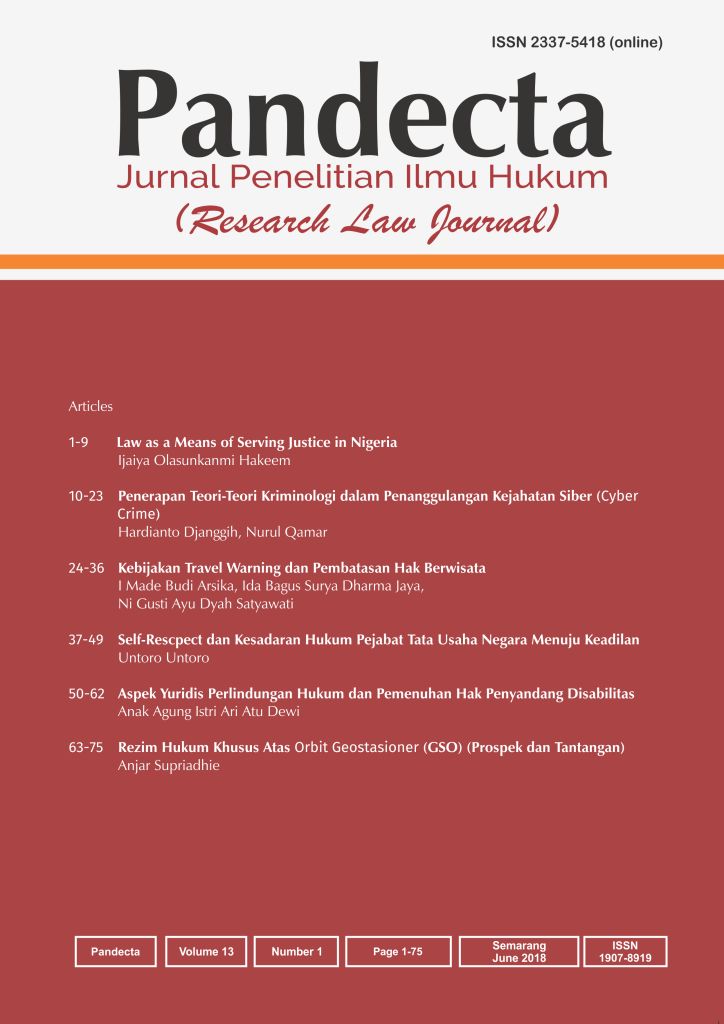Application of The Juridic-Scientific Religious Approach Model in Execution of Penal Law Enforcement
(1) Faculty of Law, Universitas Negeri Semarang, Indonesia
(2) Faculty of Law, Universitas Negeri Semarang
(3) Faculty of Law, Universitas Negeri Semarang
(4) Faculty of Law, Universitas Negeri Semarang
(5) Supreme Court of the Republic of Indonesia
Abstract
Reforming the criminal application legislation in the national legal system is critical. This research uses the paradigm of legal constructivism and the type of research used is juridical-sociological. Criminal law enforcement regulations are currently still scattered in various laws and regulations, it is not impossible that they will disrupt the law enforcement system, especially in the implementation of criminal decisions/actions. Character building is an effort to establish a conservation value system to achieve the value of justice, the value of certainty and the value of benefit in law enforcement for the implementation of criminal law. Therefore, efforts are needed to enforce the law on the implementation of criminal law through a juridical-scientific-religious approach that is oriented (guided) on “science” (criminal implementation law) and “God’s guidance”. The juridical-scientific religious approach is realized as a concrete effort to reform the law through reforming the substance and culture of the law. In reforming the legal substance, the religious approach is carried out by making religious teachings a source of motivation, inspiration, and creative evaluation source in building legal people with noble character, so that concrete efforts must be developed in the content of national legal development policies.
Keywords
Full Text:
PDFReferences
Alia, I., & Nuridin. (2021). Rekonstruksi Kebijakan Hukum Pelaksanaan Pidana Denda Berbasis Nilai-Nilai Islam. Pandecta, 16(1), 148–163.
Arief, B. N. (2014). Masalah Penegakan Hukum dan Kebijakan Hukum Pidana dalam Penanggulangan Kejahatan. Kencana Prenada Media Group.
Arief, B. N. (2015a). Ilmu Hukum Pidana Integralistik: Pemikiran Integratif dalam Hukum Pidana. Pustaka Magister.
Arief, B. N. (2015b). Reformasi Sistem Peradilan Pidana. Badan Penerbit Universitas Diponegoro.
Arief, B. N. (2016). Bunga Rampai Kebijakan Hukum Pidana: Perkembangan Penyusunan Konsep KUHP Baru, Edisi Kedua. Prenamedia Group.
Arief, B. N. (2017). Reformasi Sistem Peradilan Pidana (Sistem Penegakan Hukum) Di Indonesia. Badan Penerbit Universitas Diponegoro.
Bawekes, J. (2013). Integrated Criminal Justice System Terhadap Sistem Peradilan Tindak Pidana Perikanan. Lex Crimen, 2(7).
Effendy, M. (2012). Sistem Peradilan Pidana, Tinjauan Terhadap Beberapa Perkembangan Hukum Pidana. Referensi.
Jaya, N. S. P. (2015). Pembaharuan Hukum Pidana. Pustaka Rizki Putra.
Jaya, N. S. P. (2016). Politik Hukum. Badan Penerbit Universitas Diponegoro.
Moeljatno. (2021). Kitab Undang-Undang Hukum Pidana. Bumi Aksara.
Orman, T. F. (2016). Paradigm as a Central Concept in Paradigm Thought. International Journal of Humanities and Social Science, 6(10).
Pujiyono. (2012). Rekonstruksi Sistem Peradilan Pidana Indonesia. Pustaka Magister.
Republik Indonesia. (2009). UU No 48 tahun 2009 Tentang Kekuasaan Kehakiman. Sekretariat Negara.
Wicaksono, S. (2016). Hambatan dalam Menerapkan Pasal 6 Kovenan Internasional Tentang Hak-Hak Sipil dan Politik sebagai Dasar Penghapusan Pidana Mati di Indonesia. Pandecta, 11(1), 65–79. https://doi.org/10.15294/pandecta.v11i1.6682
Widyawati, A. (2019). Regulations Of Penitentiary Law In Indonesia. International Journal of Business, Economics and Law, 18(4).
Wiharyangti, D. (2011). Implementasi Sanksi Pidana dan Sanksi Tindakan dalam Kebijakan Hukum Pidana di Indonesia. Pandecta, 6(1), 79–85.
Refbacks
- There are currently no refbacks.


